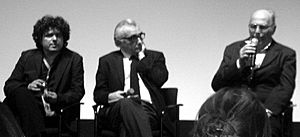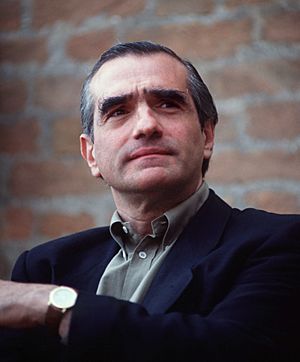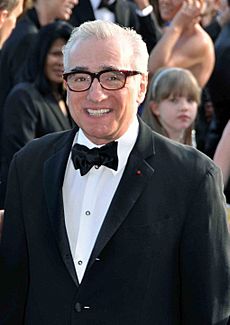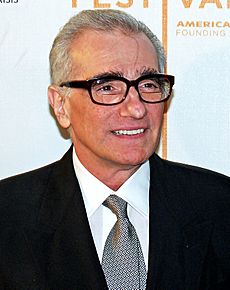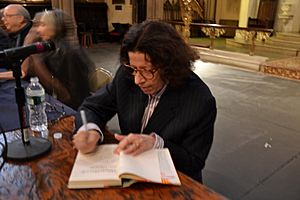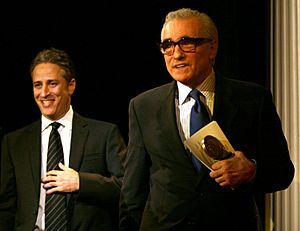Martin Scorsese facts for kids
Quick facts for kids
Martin Scorsese
|
|
|---|---|
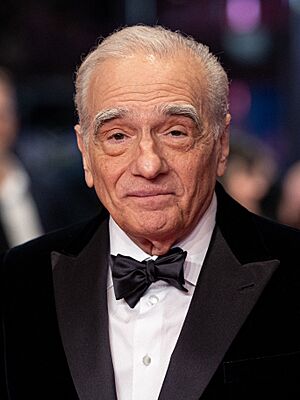
Scorsese at the Berlinale in 2024
|
|
| Born |
Martin Marcantonio Luciano Scorsese
November 17, 1942 New York City, U.S.
|
| Citizenship | United States Italy |
| Education | New York University (BA, MA) |
| Occupation |
|
| Years active | 1962–present |
|
Works
|
Full list |
| Spouse(s) |
|
| Partner(s) | Illeana Douglas (1989–1997) |
| Children | 3, including Domenica and Francesca |
| Parent(s) |
|
| Awards | Full list |
| Signature | |
 |
|
Martin Charles Scorsese (born November 17, 1942) is a famous American filmmaker. He is known for directing many popular movies. He is considered one of the most important directors from the "New Hollywood" era.
Scorsese has won many awards for his films. These include an Academy Award, four BAFTA Awards, and three Golden Globe Awards. He has also received special honors like the AFI Life Achievement Award. Several of his films are kept in the National Film Registry because they are culturally important.
He earned a Master of Arts degree from New York University in 1968. His first movie, Who's That Knocking at My Door (1967), was shown at the Chicago Film Festival. In the 1970s and 1980s, Scorsese's films often explored themes of life in New York City. His unique style, like using slow motion and freeze frames, was first seen in Mean Streets (1973).
Scorsese won the Palme d'Or at the Cannes Film Festival for Taxi Driver (1976). This movie starred Robert De Niro. De Niro worked with Scorsese on many other films, including Raging Bull (1980) and Goodfellas (1990). Later, Scorsese also worked with Leonardo DiCaprio on movies like The Departed (2006) and The Wolf of Wall Street (2013). He even directed both De Niro and DiCaprio in Killers of the Flower Moon (2023).
Besides movies, he has directed TV shows like Boardwalk Empire and documentaries about music and film history. He is also a strong supporter of film preservation, helping to save old movies.
Growing Up and School
Martin Charles Scorsese was born in Queens, New York City, on November 17, 1942. He grew up in the Little Italy area of Manhattan. His parents, Catherine Scorsese and Charles Scorsese, both worked in the clothing industry. His grandparents were immigrants from Sicily, Italy.
When he was a boy, Scorsese had asthma. This meant he couldn't play sports much with other kids. Instead, his parents and older brother often took him to the movies. This is how he fell in love with cinema. He was especially influenced by films like Black Narcissus (1947) and The Red Shoes (1948).
He also loved movies by directors like Jean Renoir and Alfred Hitchcock. He learned a lot from the French New Wave films, which changed how many filmmakers worked. He also enjoyed books by authors like Fyodor Dostoevsky.
Scorsese went to Cardinal Hayes High School in the Bronx. He first thought about becoming a priest. But he decided to study film instead. He went to New York University and earned his bachelor's degree in English in 1964. He then got his Master of Arts degree from NYU in 1968.
His Filmmaking Journey
Early Films and First Big Movie
While at New York University, Scorsese made short films like What's a Nice Girl like You Doing in a Place like This? (1963). His short film The Big Shave (1967) was a dark comedy. He was inspired by his film professor, Haig P. Manoogian. Scorsese also worked as an assistant cameraman and editor early in his career.
In 1967, he made his first full-length movie, Who's That Knocking at My Door. He worked with his classmates, actor Harvey Keitel and editor Thelma Schoonmaker. Both became his long-time friends and colleagues. Film critic Roger Ebert praised the movie, calling it "a great moment in American movies."
Scorsese became friends with other young directors like Steven Spielberg and Francis Ford Coppola. One of these friends, Brian De Palma, introduced him to actor Robert De Niro. Scorsese also worked on the documentary Woodstock (1970). He met director John Cassavetes, who became a mentor to him.
He also worked with producer Roger Corman, who taught him how to make entertaining films with small budgets. After making Boxcar Bertha (1972) for Corman, Cassavetes encouraged Scorsese to make the movies he truly wanted to make.
Becoming a Well-Known Director
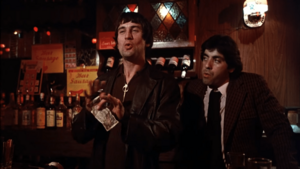
Mean Streets (1973) was a big success for Scorsese, Keitel, and De Niro. Critics loved its unique style and story about life in New York. This film showed Scorsese's signature style, including fast editing and using popular music.
In 1974, actress Ellen Burstyn chose Scorsese to direct her in Alice Doesn't Live Here Anymore. She won an Academy Award for her role. Scorsese also made a documentary about his parents called Italianamerican (1974).
His 1976 film Taxi Driver made him a very respected filmmaker. It starred De Niro as a troubled character. The film won the top prize at the Cannes Film Festival and was nominated for four Oscars.
After Taxi Driver, Scorsese directed the musical New York, New York (1977). It starred De Niro and Liza Minnelli. The movie's title song became very famous.
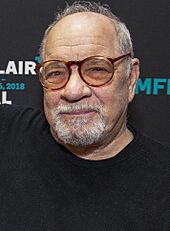
In 1980, Scorsese made Raging Bull, a movie about boxer Jake LaMotta. Many people consider it a masterpiece. It was nominated for eight Oscars, and De Niro won Best Actor. Thelma Schoonmaker also won an Oscar for editing. This film further developed Scorsese's unique visual style.
His next film with De Niro was The King of Comedy (1982). It was a different kind of movie, looking at fame and media. In 1985, he directed After Hours, a dark comedy that won him a Best Director award at Cannes.
In 1986, Scorsese directed The Color of Money, starring Paul Newman and Tom Cruise. Newman won an Oscar for his role. This film helped Scorsese get support for a project he had wanted to make for a long time: The Last Temptation of Christ (1988). This film explored the life of Christ in a very human way.
Becoming a Master Director
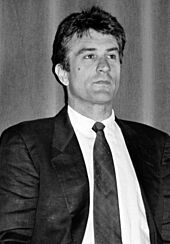
In 1990, Scorsese released Goodfellas, a gangster movie that many critics loved. It starred De Niro and Joe Pesci. Pesci won an Academy Award for his performance. The film is considered one of Scorsese's greatest achievements.
He then directed Cape Fear (1991), a thriller starring De Niro. In 1993, he made The Age of Innocence, a period drama set in 19th-century New York. This was a different type of film for him, but it was highly praised.
Casino (1995) was another crime film, similar to Goodfellas. It was a box office success. Scorsese also made a four-hour documentary in 1995 called A Personal Journey with Martin Scorsese Through American Movies, exploring American cinema history.
In 1997, he directed Kundun, a film about the early life of the Dalai Lama. This film showed a new visual style for Scorsese. His 1999 film, Bringing Out the Dead, was a dark comedy set in New York.
Recent Work in Film and TV
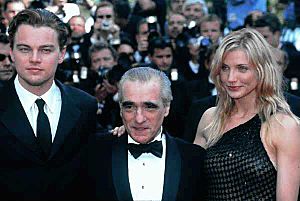
In 2002, Scorsese directed the epic film Gangs of New York. It was a big production set in 19th-century New York. This film was his first collaboration with actor Leonardo DiCaprio. Gangs of New York received 10 Academy Award nominations.
Scorsese then directed The Aviator (2004), a movie about the life of Howard Hughes. It starred Leonardo DiCaprio and received many awards, including five Oscars.
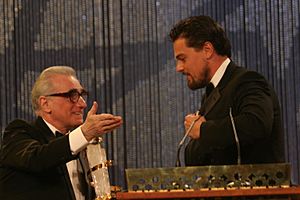
In 2006, Scorsese returned to crime films with The Departed. This movie starred Leonardo DiCaprio, Matt Damon, and Jack Nicholson. It was a huge success and finally won Scorsese his first Academy Award for Best Director. The film also won Best Picture.
He directed the concert film Shine a Light (2008), featuring the band the Rolling Stones. In 2010, he directed the pilot episode for the HBO series Boardwalk Empire, winning an Emmy Award for it.
His 2011 film Hugo was a 3D adventure film based on a novel. It was praised by critics and won five Academy Awards. In 2013, he directed The Wolf of Wall Street, starring Leonardo DiCaprio. This film was nominated for five Oscars.
Scorsese continued to direct documentaries, including The 50 Year Argument (2014) about a famous book review. He also directed the pilot for the HBO series Vinyl (2016). In 2015, he directed a short film called The Audition, which brought together Leonardo DiCaprio and Robert De Niro for the first time under his direction in two decades.
His 2016 film Silence was a drama about Jesuit priests in 17th-century Japan. In 2019, he released The Irishman on Netflix, starring Robert De Niro, Joe Pesci, and Al Pacino. It received ten Academy Award nominations.
In 2021, Scorsese released the Netflix documentary series Pretend It's a City, featuring author Fran Lebowitz. His most recent film, Killers of the Flower Moon (2023), reunited him with both Leonardo DiCaprio and Robert De Niro. It premiered at the Cannes Film Festival and was nominated for many awards.
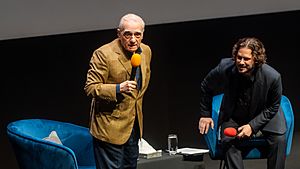
Scorsese continues to work on new projects. He is planning a biopic about the band Grateful Dead and another film with Leonardo DiCaprio called The Wager. He is also considering making a new film about Jesus.
How He Makes Films
Scorsese has a unique filmmaking style. He often works with the same actors, writers, and crew members. For example, he has collaborated with editor Thelma Schoonmaker for many years.
Special Camera Tricks
Scorsese often uses slow motion in his films, like in Who's That Knocking at My Door and Mean Streets. He also uses freeze frames, where the action suddenly stops, as seen in Goodfellas and Casino. He is known for long, flowing camera shots, especially in movies like Taxi Driver and Hugo.
He sometimes uses a special effect called an "iris," which is a circle that closes in on a character. This is a nod to old silent films. Scorsese also frequently uses the song "Gimme Shelter" by The Rolling Stones in his films.
Appearing in His Own Movies
Scorsese often makes a quick appearance, called a cameo appearance, in his own films. You might spot him in Taxi Driver, The Age of Innocence, or Hugo. Sometimes, he just provides his voice without being seen, like in The Aviator.
Important Themes
A common theme in many of his films is the idea of guilt and the role of Catholicism. He explores these ideas in movies like Mean Streets and Silence.
His films also sometimes show how power can be misused, like by police officers or politicians. He is known for using strong language and intense scenes in his movies.
Working with the Same People
Scorsese frequently casts the same actors. Robert De Niro has worked with him on ten feature films. Scorsese has said that De Niro's best performance for him was in The King of Comedy. More recently, Leonardo DiCaprio has become another frequent collaborator, working with Scorsese on six feature films.
Other actors who have appeared in multiple Scorsese films include Harvey Keitel, Joe Pesci, Daniel Day-Lewis, and Liam Neeson. His parents, Charles Scorsese and Catherine Scorsese, also had small roles in some of his movies.
For his crew, he often works with editor Thelma Schoonmaker, cinematographers Robert Richardson and Rodrigo Prieto, and screenwriters like Paul Schrader.
Personal Life
Marriages and Family
Scorsese has been married five times. He has three daughters. His first daughter, Catherine, was born during his marriage to Laraine Marie Brennan.
He later married writer Julia Cameron, and they had a daughter named Domenica Cameron-Scorsese. Domenica has also acted in some films.
In 1979, he married actress Isabella Rossellini. His current wife is Helen Schermerhorn Morris, whom he married in 1999. They have a daughter named Francesca, who has appeared in his films like The Departed and Hugo.
Beliefs
Scorsese identifies as a Catholic. He has spoken about how his faith influences his films and his life.
He has also expressed his views on important world events, such as the Iraq War.
Filmography
As of 2023, Scorsese has directed 26 full-length movies and 16 full-length documentaries.
| Year | Title | Distributor |
|---|---|---|
| 1967 | Who's That Knocking at My Door | Joseph Brenner Associates |
| 1972 | Boxcar Bertha | American International Pictures |
| 1973 | Mean Streets | Warner Bros. |
| 1974 | Alice Doesn't Live Here Anymore | |
| 1976 | Taxi Driver | Columbia Pictures |
| 1977 | New York, New York | United Artists |
| 1980 | Raging Bull | |
| 1982 | The King of Comedy | 20th Century Fox |
| 1985 | After Hours | Warner Bros. |
| 1986 | The Color of Money | Buena Vista Distribution |
| 1988 | The Last Temptation of Christ | Universal Pictures |
| 1990 | Goodfellas | Warner Bros. |
| 1991 | Cape Fear | Universal Pictures |
| 1993 | The Age of Innocence | Columbia Pictures |
| 1995 | Casino | Universal Pictures |
| 1997 | Kundun | Buena Vista Distribution |
| 1999 | Bringing Out the Dead | Paramount Pictures / Buena Vista International |
| 2002 | Gangs of New York | Miramax Films |
| 2004 | The Aviator | Warner Bros. Pictures / Miramax Films |
| 2006 | The Departed | Warner Bros. Pictures |
| 2010 | Shutter Island | Paramount Pictures |
| 2011 | Hugo | |
| 2013 | The Wolf of Wall Street | |
| 2016 | Silence | |
| 2019 | The Irishman | Netflix |
| 2023 | Killers of the Flower Moon | Paramount Pictures / Apple TV+ |
Other Important Work
Saving Films for the Future
Scorsese is a leader in film preservation and restoration. In 1990, he started The Film Foundation, a non-profit group that works to restore old or damaged films. He founded it with other famous directors like Steven Spielberg and George Lucas.
The foundation has helped restore over 800 films from around the world. It also teaches young people about film history. Scorsese has received awards for his work in saving films.
The World Cinema Project
In 2007, Scorsese created the World Cinema Project. Its goal is to save and show films from parts of the world where film history might be lost. This project helps make these important films available to everyone.
The African Film Heritage Project
In 2017, Scorsese launched The African Film Heritage Project (AFHP). This project works to find and preserve 50 classic African films. The goal is to make sure these films are restored and shown in Africa and worldwide.
Supporting Other Filmmakers
Scorsese is known for supporting other directors. He has served as an executive producer for films by many up-and-coming filmmakers. He also often talks about directors and artists he admires, like Woody Allen, Spike Lee, and Greta Gerwig.
Favorite Movies
Scorsese has shared lists of his favorite films. In 2012, he picked 12 films for a poll, including 2001: A Space Odyssey and Citizen Kane. In 2022, he added three more films to his list.
He also shared his favorite films from the 1990s, which included The Thin Red Line and Eyes Wide Shut.
Legacy and Awards
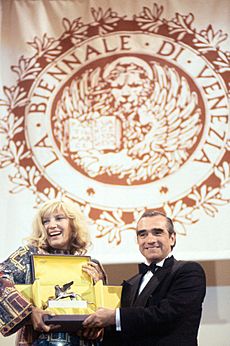
Scorsese's films have received many awards and nominations. He won an Academy Award for The Departed. In 1997, he received the AFI Life Achievement Award, a very high honor.
The American Film Institute has listed several of his films among the greatest American movies. These include Raging Bull, Taxi Driver, and Goodfellas. In 2005, he received the French Legion of Honour for his contributions to cinema.
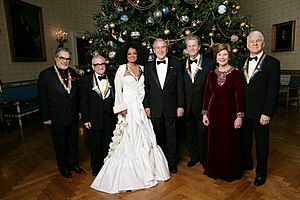
In 2007, Time magazine named him one of the 100 Most Influential People in The World. He was also honored with a Kennedy Center Honor in 2007. In 2010, he received the Golden Globe Cecil B. DeMille Award for his outstanding contributions to entertainment.
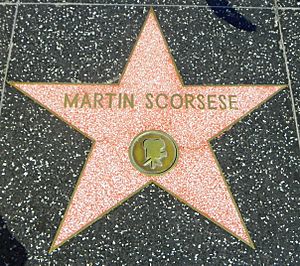
In 2011, he received an honorary doctorate from the National Film School in Lodz, Poland. He also has a star on the Hollywood Walk of Fame. In 2013, he was the first filmmaker to be chosen for the Jefferson Lecture, a high honor in the humanities.
Many other famous directors, like Ingmar Bergman and Akira Kurosawa, have praised Scorsese's work. In 2020, director Bong Joon-ho quoted Scorsese when accepting his Oscar, saying, "the most personal is the most creative."
In 2021, George Lucas and his wife made a donation to New York University to create the Martin Scorsese Institute of Global Cinematic Arts. This will help future filmmakers learn and grow.
Awards and Nominations
| Year | Title | Academy Awards | BAFTA Awards | Golden Globe Awards | |||
|---|---|---|---|---|---|---|---|
| Nominations | Wins | Nominations | Wins | Nominations | Wins | ||
| 1974 | Alice Doesn't Live Here Anymore | 3 | 1 | 7 | 4 | 2 | |
| 1976 | Taxi Driver | 4 | 7 | 3 | 2 | ||
| 1977 | New York, New York | 2 | 4 | ||||
| 1980 | Raging Bull | 8 | 2 | 4 | 2 | 7 | 1 |
| 1983 | The King of Comedy | 4 | 1 | ||||
| 1985 | After Hours | 1 | 1 | ||||
| 1986 | The Color of Money | 4 | 1 | 2 | |||
| 1988 | The Last Temptation of Christ | 1 | 2 | ||||
| 1990 | Goodfellas | 6 | 1 | 7 | 5 | 5 | |
| 1991 | Cape Fear | 2 | 2 | 2 | |||
| 1993 | The Age of Innocence | 5 | 1 | 4 | 1 | 4 | 1 |
| 1995 | Casino | 1 | 2 | 1 | |||
| 1997 | Kundun | 4 | 1 | ||||
| 2002 | Gangs of New York | 10 | 12 | 1 | 5 | 2 | |
| 2004 | The Aviator | 11 | 5 | 14 | 4 | 6 | 3 |
| 2006 | The Departed | 5 | 4 | 6 | 6 | 1 | |
| 2011 | Hugo | 11 | 5 | 9 | 2 | 3 | 1 |
| 2013 | The Wolf of Wall Street | 5 | 4 | 2 | 1 | ||
| 2016 | Silence | 1 | |||||
| 2019 | The Irishman | 10 | 10 | 5 | |||
| 2023 | Killers of the Flower Moon | 10 | 9 | 7 | 1 | ||
| Total | 101 | 20 | 102 | 23 | 68 | 11 | |
See also
 In Spanish: Martin Scorsese para niños
In Spanish: Martin Scorsese para niños
- Martin Scorsese's unrealized projects


